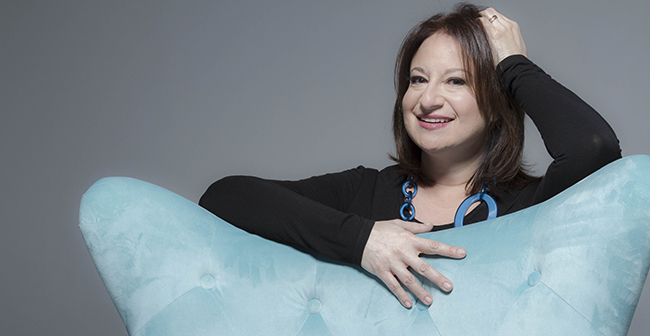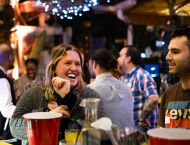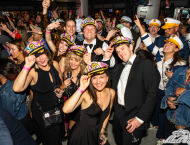Culture
 Photo: Francisco Campos-Lopez
Photo: Francisco Campos-Lopez
A Q&A With Washington Performing Art’s Jenny Bilfield On The Portals Of Art and More
March 15, 2019 @ 12:00am
Jenny Bilfield was once told to work as a receptionist and luckily for the DC area, she ignored this request. Instead, the President and CEO of Washington Performing Arts listened to the impactful women in her life telling her to be ambitious, develop a powerful work ethic and to channel her experiences along the way.
At the helm of the local art organization, Bilfield has steered toward community and education programs, ensuring people receive the same inspiration and motivation as she did in her formative years. We talked to Bilfield about her love for all things art, her trials and tribulations in the professional world and why it’s important for young people.
On Tap: How did you get your start in the arts?
Jenny Bilfield: I started playing the piano by ear when I was three, and composing when I was 10. I was the only person in my family with artistic ability, but my mother loved the arts, especially contemporary art, music, theater and so we attended everything. I’m sure my very early exposure and encouragement conditioned me to be open to a variety of art forms, sounds [and] environments.
OT: Why is art important to you and when did you know you wanted to have a career in the field?
JB: For me, the arts provide portals to history, emotion, experience, human understanding; they enlighten, engage, inspire [and] educate. I have learned so much through the work of great artists. Artists have an arsenal of tools to synthesize and express the complexity and beauty of our world in ways that engage the heart and mind, afresh. I knew that I wanted to pursue a career in the arts from the time I was pretty young – I decided when I was around 17 or 18, that I preferred making music happen (promoting and programming it) more than I liked the solitary confinement of a practice room. An internship coordinating a Beethoven Festival on Long Island one summer, clinched it for me.
OT: What are some of the biggest challenges you faced in your career and how did you overcome them?
JB: I started working in 1985 in New York City – 20 years old, right out of college. I encountered a number of challenges early on: the assumption, from prospective employers (male) that I was going to work only until I met a man and got married. In addition, I was told I needed to choose a path, marketing, fundraising, PR, programming, etc., and that my desire to lead or run an organization was both unrealistic and hasty; organizational leadership wasn’t a track, they insisted. It took me a few years to actually run an organization, but I did have very interesting roles before I got to that point: coordinating special projects and programs for Merkin Concert Hall, working as Philip Glass’s assistant, etc. Several organizations I worked for early on weren’t especially large or stable, but I learned by doing and took some pretty important risks in order to develop my leadership chops and operational capacity across all areas of management and programming. I also developed a strong stomach for the organizational volatility that comes with working for a small institution.
OT: What are you most proud of achieving in your career? How do you set goals, and what are some that you’re working on now?
JB: A great question and opportunity to walk down memory lane! I am proud of the expansive work I’ve done on behalf of living composers – founding the New Music Orchestral Project and bringing 40 new works to life through performances and reading sessions; my leadership role at Boosey & Hawkes during, which I developed composer-focused initiatives and catalog acquisitions, partnerships that measurably grew our composers’ profiles, work and opportunities globally (and our overall catalog) while generating new revenue for the company to currently at Washington Performing Arts, developing programs (connecting mainstage, community-engagement and educational) that have provided artists with transformative platforms for their most special projects and facilitated deeper connections with audiences. I do this alongside a great team and with strong board support, and find it incredibly powerful to curate programs in DC, drawing upon the cultural resources and partnerships in this city. Those partnerships have enabled us to shine a spotlight on key themes and moments in American history – something we are aiming to do more of.
OT: What advice would you give to women pursuing careers in the arts?
JB: Personal advice: as you consider a life partner, be sure that the person you’re with is fully invested in your career and your success [because] this field requires a high level of work, life integration and if you’re on a leadership path there will be many demands placed upon your time. Professional advice: develop quantitative skills and be comfortable with data and numbers, even if you don’t expect to be a CFO or Marketing/Development Director. If invited to join a board, join the finance or governance committee; if you have experience in this area, you will be steps ahead of your peers whether you oversee programming, education or operations.
OT: Did you get any advice from someone when you were first beginning your journey?
JB: From two men – advice to work as a receptionist at an organization for several years and then apply for another entry level job within the organization; I did not take this advice. From several women: be ambitious, prepared, develop a good work ethic and use my experience. This advice, I did take. I had quite a number of anti-role models, and quite a number of true role models. It’s important to meet and speak with a lot of people to see, hear what resonates.
OT: How is Washington Performing Arts working to empower women in the workplace and on the stage?
JB: Our leadership team is 50 percent women (we have many on the wider staff, in fact), with a similar proportion on our board and junior board. We have a dynamic women’s committee too – and some of the most well-established, respected women in our field got their early start on the staff of Washington Performing Arts. On stage, we seek to foreground talent across many musical genres and styles and have found ample opportunities to highlight women – as performers, curators, composers, artists in residence.
OT: Why do you think arts education is important in schools?
JB: First and foremost, because I think arts exposure and participation enables us to access what is ambiguous, personal and very human in ourselves. The reason it’s important to have arts education within the schools (versus only as an extracurricular) is that when it’s included during the school day – as part of the curriculum – it becomes an educational priority, on par with other subjects. Whether its value is measured by social and emotional development of our children or by improvement in behavior or math skills, the arts can have a powerful impact.
OT: What excites you most in the DC arts scene right now?
JB: I really like my colleagues who are leading peer institutions and have found an abundance of creative, collaborative opportunities. Many of our institutions are committed to new work, arts education, and to forging meaningful relationships with community-based artists and organizations – social responsibility alongside a commitment to artistic excellence. So, it’s an interesting time to be in Washington as both artist and audience member.
For more information about Bilfield or Washington Performing Arts, visit www.washingtonperformingarts.com.
This interview was edited for length and clarity.







